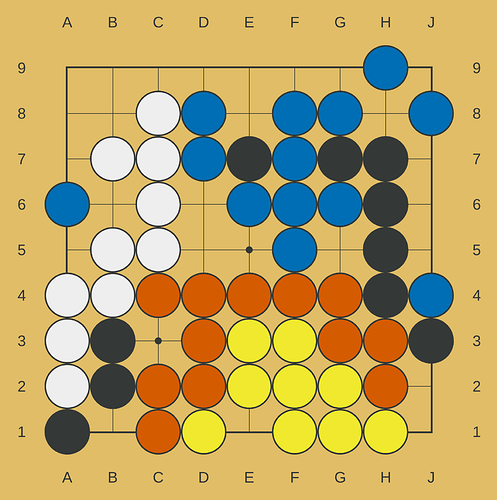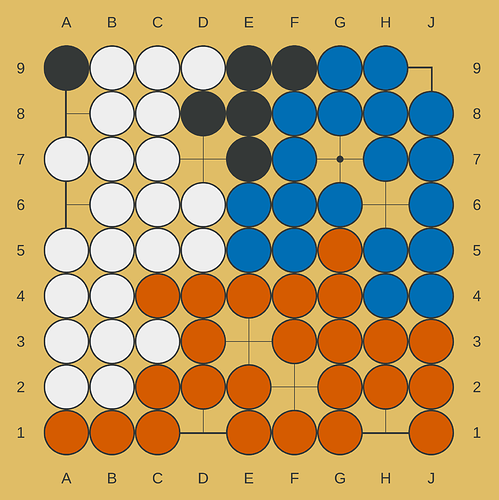I’ll try to illustrate my proposal in practice using the first game. Assume each player has paid $100 to take part in the game, so there is a total prize-pool of $500, and each payout will distribute $100.

In this position, yellow might expect to be captured in the coming round, so decides to drop out now. The fact that yellow has dropped out is announced together with the other moves from the next round, but the dropout is handled first.
In “unsettled” positions, you mostly get rewarded for how many stones you have on the board; the only intersections that count as territory in this case are E1 and J9. Taking those into account, we get the following areas:
Blue: 14
Red: 12
White: 10
Black: 10
Yellow: 10
The total amount of claimed area is 14 + 12 + 10 + 10 + 10 = 56.
Yellow, black and white will thus all get $100 * (10 / 56) ≈ $17.86, while red gets $21.43 and blue gets $25.00.
Now let’s jump ahead to this point (where the real game ended):

Black should maybe have dropped out earlier (right before their group on the right was captured), but let’s assume they decided to stay in the game until this point. It looks very likely that the top group will be captured on the next move, so they drop out now, and another payout is made.
Areas
Red: 28
White: 23
Blue: 22
Black: 6
Total: 79
Money (old + new)
Red: $21.43 + $35.44 = $56.87
White: $17.86 + $29.11 = $46.97
Blue: $25.00 + $27.85 = $52.85
Black: $17.86 + $7.59 = $25.45
Yellow: $17.86 + $0 = $17.86
Notice that since all yellow stones have been captured before this, yellow will not gain any more money during the rest of the game.
In the coming moves, the black chain will be captured, and that area will be divided between white and blue. Red might also try to throw a stone or two in there, which may or may not survive until the dropout depending on the exact sequence. For simplicity, let’s assume we reach this position:
Here white drops out, since blue and red will probably capture on the next move. White could try to play A8 first, but if blue and red foresee this, they could work around it with a planned collision. The two extra points are probably not worth the big risk for white.
Areas
Red: 28
White: 26
Blue: 25
Black: 1
Total: 80
Money (old + new)
Red: $56.87 + $35.00 = $91.87
White: $46.97 + $32.50 = $79.47
Blue: $52.85 + $31.25 = $84.10
Black: $25.45 + $1.25 = $26.70
Next up, white is captured. Blue and red divide the area, each trying to claim as much as possible. Let’s assume that the final board looks something like this:
Both players drop out in this position. They could try throwing in stones into the others territory and then immediately dropping out, but if both do this and then only one of them drops out, the other one is at an advantage (they will empty their own territory before dropping out). Assume for simplicity that they both decide that this is the best that they can do. Since both drop out here, we get a “double” payout from this position.
Areas
Red: 40
Blue: 41
Money (old + new)
Red: $91.87 + $49.38 + $49.38 = $190.63
Blue: $84.10 + $50.62 + $50.62 = $185.34
Payout summary
Red: $190.63
Blue: $185.34
White: $79.47
Black: $26.70
Yellow: $17.86
Even with the doubled importance of the final position, blue didn’t quite catch up in terms of money, since they only barely catched up in terms of area. If blue had managed to get 43 points in the final position, that would have been enough to make more money than red in total.
Personally, since I think we shouldn’t think in terms of “winning” an isolated game, but rather in terms of maximizing expected winnings, I don’t mind the fact that the “winner” in the final position isn’t also the one making the most money. But if other people don’t like this, we could make such situations much rarer by doing an extra (bigger) payout right at the end, like I’ve mentioned before.








